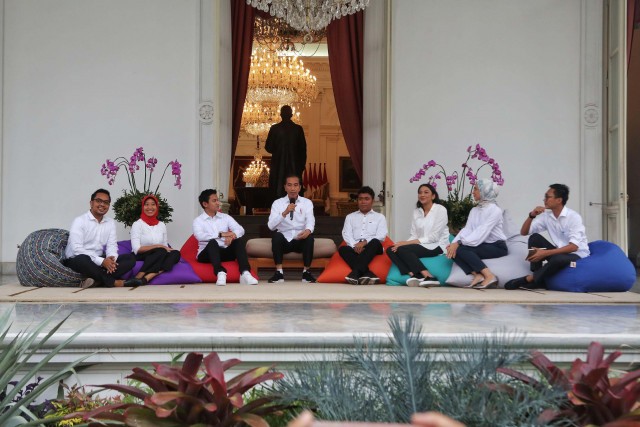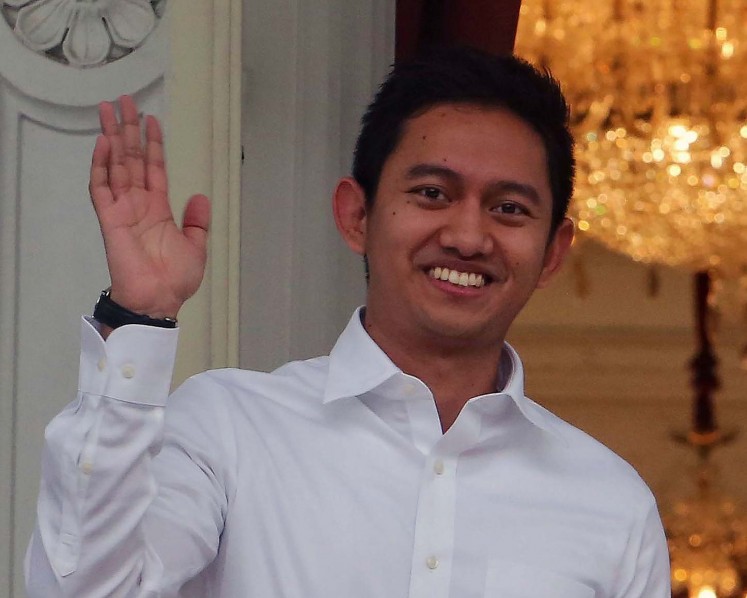Popular Reads
Top Results
Can't find what you're looking for?
View all search resultsPopular Reads
Top Results
Can't find what you're looking for?
View all search resultsConflict of interest? Public questions government's relationship with start-ups
Among presidential expert staff members are start-up founders and leaders.
Change text size
Gift Premium Articles
to Anyone
T
he government’s relationship with the country’s start-ups during the pandemic have raised eyebrows as the latter have been invited to get involved in national-scale programs, including the multitrillion rupiah preemployment card program, with lack of transparency, experts have said.
Recently, an expert staff member to President Joko "Jokowi" Widodo, Andi Taufan Garuda Putra, was criticized for sending out a letter bearing the Cabinet’s Secretariat’s letterhead asking district heads across Indonesia to support a COVID-19 relief program led by his fintech start-up, Amartha.
He issued the letter on April 11 without acknowledgement of the home minister, who supervises regional leaders, prompting the public to question the government’s impartiality. Andi has since revoked the letter and issued an apology, saying that his intention was to do something good as quickly as possible.
Andi Taufan Garuda Putra (JP/Seto Wardhana)“There is clearly a conflict of interest that could lead to abuse of authority,” said Indonesian Forum for Budget Transparency (Fitra) secretary-general Misbah Hasan in a text message to The Jakarta Post on Tuesday.
“CEOs should step down prior to working in the government to be neutral. But I think the government was wrong in the way it recruited these CEOs because these appointments could hinder their creativity in improving their start-ups,” Misbah said.
Read also: Underprivileged millennials: Being young and poor in Jakarta
There have been other cases like that of Andi’s. Adamas Belva Devara, another presidential expert staff member who is also education start-up Ruangguru CEO, also got caught up in controversy as his company was appointed by the government as among several start-ups to provide training in the preemployment card program.
On Wednesday, he clarified the situation on his personal Twitter account following complaints from netizens, saying he had asked State Palace officials if there was a conflict of interest despite the fact that he was not involved in the program’s partner selection process. He said he was ready to step down from the position but the decision “should be discussed with the palace”.
Adamas Belva Syah Devara (JP/Seto Wardhana)The program, which aims to reskill and upskill laid-off workers amid the pandemic, has been allocated Rp 20 trillion (US$1.2 billion) from the state budget fund to cover around 5.6 million participants. Each participant will receive Rp 3.55 million, of which as much as Rp 1 million is for training costs, Rp 2.4 million for living cost incentives for four months and Rp 150,000 for job survey fees.
If the program’s goods and services procurement was carried out through an appointment, the decision violated Presidential Regulation (Perpres) No. 16 /2018 on government procurement, which states that procurement valued at Rp 200 million and above should be done through a tender, Misbah said.
“Even during the pandemic, the procurement and bidding must be transparent, accountable and open for all eligible providers through the Electronic Goods and Services Procurement [LPSE] system,” he said.
He went on to say that since the program has been rolled out, the next thing to do would be for the National Public Procurement Agency (LKPP), the Government Internal Supervisory Agency (APIP) and the Supreme Audit Agency (BPK) to audit the procurement process, including the start-ups involved in the program.
Read also: COVID-19: Jokowi staffer criticized for requesting local leaders to support his company
Ruangguru CEO Iman Usman addressed the issue on his Twitter account @imanusman on Tuesday. He said procurement for the preemployment card was more like social aid programs, such as the Indonesia Smart Card (KIP), in which aid recipients could use the money they received to buy books, for instance, in partnering bookstores that “have fulfilled certain requirements”.
“The preemployment card is similar, people can choose courses from the eight digital platforms that have qualified,” he said in one of the tweets without specifying the qualifications.
Other than Ruangguru’s Skill Academy, education start-ups MauBelajarApa, Pijar, Pintaria and e-commerce unicorn Tokopedia-backed Tokopedia Pintar, among other start-ups, are also engaged in the program. Meanwhile, e-wallet GoPay, OVO and state-owned companies-backed LinkAja will channel the funds to the participants’ digital wallet.
Corporate affairs chief Nila Marita of Gojek, which will be involved in the preemployment card program through its e-wallet GoPay, told the Post that the start-up had been “officially appointed by the government” to be a payment partner in the program.
Tokopedia, also stated in a press release on March 23 that it had been “appointed as an official digital platform by the Office of the Coordinating Economic Minister to launch the pre-employment card features.”
Institute for Development of Economics and Finance (Indef) economist Bhima Yudhistira said the government could use free and existing facilities, such as university websites, to offer online lessons for the preemployment program, instead of spending money on start-up platforms.
Read also: Govt partners with food, ride-hailing companies to guarantee food supplies during outbreak
“Some start-ups are cozying up to the government to keep getting projects and sustain their business,” he told The Jakarta Post over the phone on Tuesday. Such practice, he added, would create a bad precedent for future start-ups as they might think that businesses needed the government as a patron to ensure sustainability, creating new generations of oligarchs.
Throughout March and April, other government bodies have partnered with start-ups in other sectors as well.
The Agriculture Ministry signed a memorandum of understanding with ride-hailing apps Gojek and Grab to sell staple foods from the ministry’s marketplace Toko Tani Indonesia Center as well as partnered with e-commerce platform Blibli.com to sell rice.
Meanwhile, the Health Ministry signed an MOU last month with 11 telemedicine start-ups, including Halodoc and Good Doctor Technology Indonesia, which can be accessed through Gojek and Grab, respectively.












